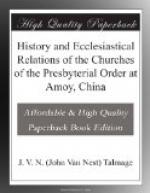In consequence of such division, the native Churches will not be so able to support the Gospel among themselves. Look at the condition of our western towns in this respect. Why strive to entail like evils on our Missionary churches? Their strength will be weakened for evangelistic effort. Their Missionary efforts is one of the most striking and praiseworthy characteristics of the Amoy churches. How will they be shorn of their strength by division and necessary rivalry! Besides this, if the connection with the Church at home be anything more than nominal, our churches should, in part at least, work through the Church at home. No? Then why form the connection?
4. Instead of the Dutch Church being the Presbyterian Church at Amoy, it will only be a small Church, bearing about the same proportion to the other Christian Churches there, that it does to the other Churches in this land. Why is not the Dutch Church the principal Presbyterian body in this land? Unless we are mistaken in regard to its excellency of order, it has all the adaptedness, and it was here first. Do you wish a similar result in China?
* * * * *
That it may be seen whether the Missionaries of Amoy have asked of our Church to “surrender the Constitution, the policy, the interests of our Church,” “nay, even their own welfare, and that of the Mission they are so tenderly attached to”—whether what they ask for “is flatly in the face of our Constitution and order”—whether the “Synod has no right to form, or to authorize any such self-regulating, ecclesiastical body, or to consent that any Ministers of our Church should hold seats in such a body”—whether, “if we do it, we transcend the most liberal construction which has ever been known to be given to the powers of the General Synod”—whether, by granting the request of the Missionaries, “we violate our own order, our fundamental principles, the polity to which we are bound by our profession, by our subscription, by every tie which can bind religious and honorable, men”—I will append the resolution which was offered by me in the General Synod as a substitute for those offered by the Committee. If it called for declamation like the above, well. These are the words:
Resolved, That the Synod learn, with gratitude to God, of the great progress of the work of the Lord at Amoy, and in the region around, so that already we hear of six organized churches with their Consistories, and others growing up, not yet organized; two native Pastors, who were to have been ordained on the 29th of March last, and the whole under the care of a Classis composed of the Missionaries of our Church and the English Presbyterian Church, and representative Elders of the several churches. It calls for our hearty gratitude to the Great Head of the Church, that the Missionaries of different Churches, and different countries, have been enabled, through Divine grace,




